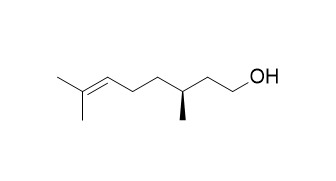(S)-(-)-beta-Citronellol
(S)-(-)-beta-Citronellol may inhibit P-gp-mediated transport and interact with P-gp substrates in the intestinal absorption process.
Inquire / Order:
manager@chemfaces.com
Technical Inquiries:
service@chemfaces.com
Tel:
+86-27-84237783
Fax:
+86-27-84254680
Address:
1 Building, No. 83, CheCheng Rd., Wuhan Economic and Technological Development Zone, Wuhan, Hubei 430056, PRC
Providing storage is as stated on the product vial and the vial is kept tightly sealed, the product can be stored for up to
24 months(2-8C).
Wherever possible, you should prepare and use solutions on the same day. However, if you need to make up stock solutions in advance, we recommend that you store the solution as aliquots in tightly sealed vials at -20C. Generally, these will be useable for up to two weeks. Before use, and prior to opening the vial we recommend that you allow your product to equilibrate to room temperature for at least 1 hour.
Need more advice on solubility, usage and handling? Please email to: service@chemfaces.com
The packaging of the product may have turned upside down during transportation, resulting in the natural compounds adhering to the neck or cap of the vial. take the vial out of its packaging and gently shake to let the compounds fall to the bottom of the vial. for liquid products, centrifuge at 200-500 RPM to gather the liquid at the bottom of the vial. try to avoid loss or contamination during handling.
Int J Mol Sci.2017, 19(1)
Anal Bioanal Chem. 2016, 408(15)
Asian Pac J Cancer Prev.2021, 22(S1):97-106.
J of Ana. Chem.2019, 74(11):1113-1121
Int J Mol Sci.2019, 21(1):E265
Institute of Food Science & Technology2021, 45(9).
Faculty of Chem. & Nat. Resource Eng.2014, 62
Environ Toxicol.2022, 37(3):514-526.
J Pharmaceut Biomed2020, 182:113110
Mol Biol Rep.2024, 51(1):117.
Related and Featured Products
Drug Metabolism & Disposition, 2008, 36(7):1206-1211.
Inhibitory Effects of Terpenoids on Multidrug Resistance-Associated Protein 2- and Breast Cancer Resistance Protein-Mediated Transport.[Reference:
WebLink]
The possibility of interactions between natural products/supplements and conventional prescription medicines is one of the most important issues in pharmacotherapeutic safety. Recently, we reported that some terpenoids such as (R)-(+)-citronellal and glycyrrhetic acid, which are present in herbal medicines, can act as inhibitors of P-glycoprotein (MDR1/ABCB1).
METHODS AND RESULTS:
In the present study, the effects of seven terpenoids on multidrug resistance-associated protein 2 (MRP2/ABCC2) and breast cancer resistance protein (BCRP/ABCG2)-mediated transport were investigated in vitro. Membrane vesicles were prepared from MRP2 cDNA transfected Sf9 cells derived from pupal ovarian tissue of Spodoptera frugiperda, a fall armyworm, and BCRP cDNA transfected LLC-PK1 cells derived from porcine kidney. MRP2- or BCRP-mediated efflux transport was measured as ATP-dependent accumulation of [(3)H]estradiol 17-beta-d-glucuronide (E(2)17betaG) into membrane vesicles collected by a rapid filtration technique. The effects of (R)-(+)-citronellal, (S)-(-)-beta-Citronellol, alpha-terpinene, terpinolene, (-)-beta-pinene, abietic acid, and glycyrrhetic acid on the intravesicular accumulation of [(3)H]E(2)17betaG were examined. Large decreases in the [(3)H]E(2)17betaG accumulation into vesicles from MRP2-overexpressing Sf9 cells were observed in the presence of glycyrrhetic acid and abietic acid, and their IC(50) values were about 20 and 51 microM, respectively. [(3)H]E(2)17betaG accumulation into vesicles from BCRP-overexpressing LLC-PK1 cells was suppressed by only glycyrrhetic acid, with an IC(50) value of about 39 microM. Other terpenoids used in this study did not alter the ATP-dependent accumulation of [(3)H]E(2)17betaG.
CONCLUSIONS:
These findings suggest that glycyrrhetic acid and abietic acid can potently inhibit MRP2- or BCRP-mediated membrane transport and may interact with their substrates in pharmacokinetic processes.
Food & Chemical Toxicology, 2006, 44(12):0-2039.
Inhibition of P-glycoprotein-mediated transport by terpenoids contained in herbal medicines and natural products.[Reference:
WebLink]
Terpenoids form a large and structurally diverse family of natural products and are ingredients of various herbal medicines. We have investigated possible interactions between herbal medicines and conventional medicines, and recently reported that monoterpenoids contained in Zanthoxyli Fructus can be potent inhibitors of P-glycoprotein (P-gp).
METHODS AND RESULTS:
In the present study, the influence of 70 kinds of terpenoids present in natural products on P-gp-mediated efflux transport was investigated. LLC-GA5-COL150 cells transfected with human MDR1 cDNA encoding P-gp were used to screen the terpenoids. Large increases in the intracellular accumulation of [H-3]digoxin were observed in the presence of (R)-(+)-citronellal, (S)-(-)-beta-Citronellol, alpha-terpinene, terpinolene, (-)-beta-pinene, abietic acid, ophiobolin A, cucurbitacin I, and glycyrrhetic acid. A study of the concentration-dependency revealed that the IC50 of ophiobolin A, glycyrrhetic acid, (R)-(+)-citronellal, abietic acid, and cucurbitacin I was smaller than that of verapamil. The transcellular transport of [H-3]digoxin across Caco-2 cell monolayers was then examined in the presence of (R)-(+)-citronellal, abietic acid, and glycyrrhetic acid. Significant increases in the apical-to-basolateral transport and decreases in the basolateral-to-apical transport and efflux ratio were demonstrated.
CONCLUSIONS:
These findings suggest that some natural products containing these terpenoids may inhibit P-gp-mediated transport and interact with P-gp substrates in the intestinal absorption process.



